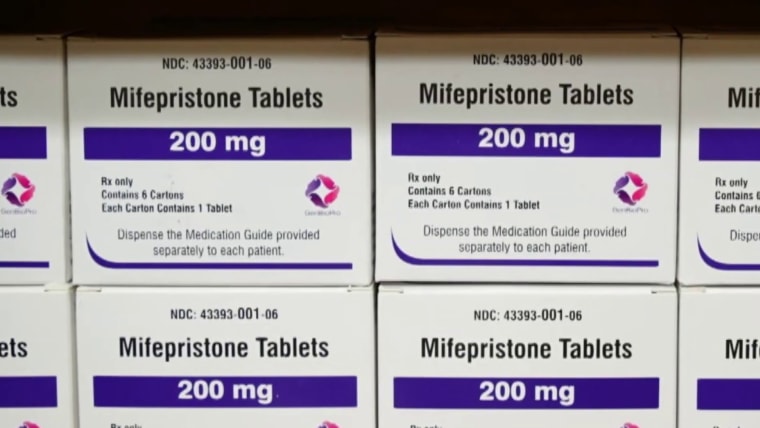Last legislative session was the quietest in decades for abortion. After successfully banning nearly all abortions, Republicans were wary about continuing to push an issue that is widely unpopular with voters.
This session, coming off a Republican rout in November, Seago is hopeful that lawmakers will feel more empowered to continue restricting abortions, and especially abortion pills.
“Texas is uniquely positioned to lead on these cutting-edge pro-life issues,” Seago said. “Some of our friends in red states are still playing defense. They’re fighting off constitutional amendments. They’re still fighting off exceptions to their laws. We’re in a solid place to start fighting back.”
Texas has no mechanism to put a constitutional amendment to increase abortion access on the ballot without the approval of lawmakers, and while Democrats have filed bills to add more exceptions to the abortion laws, they are once again expected to not get any traction.
But whether conservative efforts to further restrict abortion pills will take hold also remains to be seen. Rep. Nate Schatzline, a conservative Republican from Fort Worth, has filed House Bill 1651, which would make it a deceptive trade practice to send abortion pills through the mail without verifying that they were prescribed by an in-state doctor after an in-person exam.
Another bill, HB 991, filed by Republican Rep. Steve Toth of The Woodlands, would allow lawsuits against websites that provide information about obtaining abortion pills. Elisa Wells, co-founder of Plan C, an information repository about telehealth abortion access, said they expect any challenge to their work to run afoul of free speech protections.
“Texas is a state that values free speech, but despite that, they’re taking action to try and limit free speech with respect to abortion,” she said. “It’s a bit hypocritical.”
Wells said they take seriously any legislation that might further restrict access to abortion in states like Texas. But she said even if all the domestic access routes were shut off by lawsuits and legislation, there are international providers prepared to keep providing pills to people who need them.
“It’s ironic that a lot of these legal actions and court decisions and attempts to restrict access are what is shining a spotlight on … the fact that abortion pills are available by mail,” she said. “Every time there’s a decision like that, we just see the traffic to our site just exponentially increase. These anti-choice actions are the best advertisement.”
I’ll be shocked if there isn’t a bill to follow in Louisiana’s footsteps by reclassifying mifepristone as a controlled substance. If one hasn’t been filed yet, I’m sure it will be. At this point, just about anything they could do will likely require a massive amount of surveillance and intrusiveness to work, run afoul of the First Amendment, materially harm other forms of health care as collateral damage, or some combination of the three. Look to see what’s on Greg Abbott’s priority list. Anything there is almost a sure bet to pass, even if it requires a special session.
The first part of the story is about the Paxton lawsuit against that New York doctor, which is more complex and unpredictable than I first thought. For sure, it won’t be the only shots fired in that direction. Read it and see what’s coming.


I wonder how many “illegal” drug use laws we have in Texas? How is it working out?
I do believe Nancy was right, but if not certainly cheaper, “Just say no.”
Re: “I wonder how many “illegal” drug use laws we have in Texas? How is it working out?”
Manny, I’d say it’s working pretty good (at least it was in 2022) as the number of heroin and fentanyl deaths in Texas is pretty dang low compared to other States (i.e. only NY, CA, FL rank higher), and crazy low (46th out of 50 States) in terms of ‘death rate’ (per the CDC) due to drugs.
C.L., so you think that because of the number of deaths by heroin and fentanyl deaths in Texas, the drug laws are working here?
Do the other states have similar laws? If yes, why are the deaths higher there?
“Texas is experiencing a drug poisoning epidemic. The state’s drug poisoning deaths increased more than 75% in the past five years. In 2021, the drug poisoning death rate was 15.8 deaths per 100,000 residents. This is almost double the 2017 rate of 9.4 deaths per 100,000 residents. Males have drug poisoning death rates over twice as high as females. Non-Hispanic Whites and non-Hispanic Blacks have the highest rates of drug poisoning deaths among residents. Texas continues to see increases in stimulant use too. See Texas opioid-related emergency department data here.”
Maybe all those persons here illegally are helping hold those numbers down; it seems whites and blacks like those drugs more.
C.L., do you think that drug laws keep people from using drugs?
re: “C.L., so you think that because of the number of deaths by heroin and fentanyl deaths in Texas, the drug laws are working here?”
It appears drug laws in Texas are working ‘better’ than the drug laws in other States.
re: “C.L., do you think that drug laws keep people from using drugs?”
A nonsensical question that you already know the answer to.
re: “In 2021, the drug poisoning death rate was 15.8 deaths per 100,000 residents. This is almost double the 2017 rate of 9.4 deaths per 100,000 residents. ”
No, it’s not. An increase of 9.4 to 15.8 is not almost double – it’s a 68% increase.